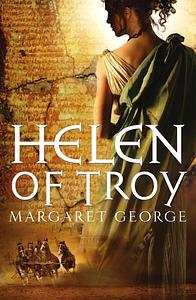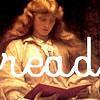Take a photo of a barcode or cover
I read this book a many years ago now. At the time my mum told me I wouldn't be able to get my head around it. Anyway I started reading it and oh my word, I loved it. I loved the way it had been written, the fluidity of it. It was fantastic. One day I will read more books written by this author and I'm really hoping they are as good as this one. This book fueled my obsession with historical fiction. Thank you Margaret George :)
Bleh...
This book did little for me. Perhaps I would have enjoyed it more had I remembered ANY of Homer.
Not sure why, but this book just DRAGGED for me, and I generally enjoy George's writing.
I suppose it is interesting to write an autobiography about a character who is only possibly a historical person. But I just couldn't get into it.
This book did little for me. Perhaps I would have enjoyed it more had I remembered ANY of Homer.
Not sure why, but this book just DRAGGED for me, and I generally enjoy George's writing.
I suppose it is interesting to write an autobiography about a character who is only possibly a historical person. But I just couldn't get into it.
adventurous
emotional
sad
medium-paced
Plot or Character Driven:
A mix
Strong character development:
Yes
Loveable characters:
Yes
Diverse cast of characters:
No
Flaws of characters a main focus:
Yes
I have very mixed feelings about this novel. At times, it was a bummer, which I should have expected, considering it's a retelling of one of the bloodiest conflicts of all time. At other times, I really enjoyed it and found Helen relatable and likeable. But most of the time, it seemed like a trashy romance novel with a veneer of respectability from its historical/literary subject.
adventurous
emotional
mysterious
sad
slow-paced
Plot or Character Driven:
Character
Strong character development:
Yes
Loveable characters:
Yes
Diverse cast of characters:
No
Flaws of characters a main focus:
Yes
adventurous
challenging
dark
emotional
reflective
sad
medium-paced
Plot or Character Driven:
Character
Strong character development:
Yes
Loveable characters:
Yes
Diverse cast of characters:
Complicated
Flaws of characters a main focus:
Yes
adventurous
slow-paced
Plot or Character Driven:
A mix
Strong character development:
No
Loveable characters:
Complicated
Diverse cast of characters:
No
Flaws of characters a main focus:
Complicated
When I first read this book, about 4 years ago, I really enjoyed it. But this summer I finally read the Iliad itself and I've been reading a lot of other mythology adaptation novels and this one kind of falls flat in comparison.
When it comes to adaptations of the Trojan war, I've noticed that authors tend to villainized one side, Acheans or Trojans, one particular character. However the Iliad itself doesn't present clear villians, both sides and characters have good and bad characteristics. They are simply being puppeteers by the gods. I can understand taking a few liberties to make the story make sense but ultimetly this book overly demonizes both Agamemnon and Achilles. The only thing I'm really thankful for is that trend didn't continue to Menelaus, because we know who wins the war and that Helen ultimately has to go home with him.
Which brings me to the romance between Helen and Paris. When I first read this I much prefered the idea of Helen actually falling in love with Paris rather than raped and abducted. I think a story about a woman held captive for 10-20 years would be really dark. It also doesn't make her a seductress which a lot of other adaptations like because they hate women. But ultimately the romance still fails to make Helen sumpatjetic bc of all the misery she ends up causing. The author tries everything she can to try and not place the blame of the war on Helen and it still doesn't make me sympathize with her, or Paris. Ultimately both the Paris and Helen from the actual Iliad by Homer are the most sympathetic.
Finally, most novel adaptations follow the greek tradition of dramatic irony. They expect that you know the story, however the characters don't. So greek plays would often have characters say things, in an oblivious manner, that foreshadows their own doom. "The Song of Achilles" by Madeline Miller and "Ariadne" by Jennifer Saint both also invoke this and they do it really well. It invokes the tragedy of the characters and their story. However, this book does a really, really, bad job of that. Better to have not bothered. At some point Helen gets the gift of prophecy but she will randomly say or think actual lines from the Iliad. Some other prophetic characters, who everyone knows they see the future, do the same. And the characters do nothing to act on it. So rather than dramatic irony we have characters predicting the future and then ignoring it. The most impact you ever get is feeling unsettled. Additionally when they introduce Cassandra the characters say she is gifted with prophecy but cursed that no one will believe her. It literally makes no sense as to why they would know that! The proper way to introduce her is to say she's crazy, because that's all the characters would actually know! George assumes you don't know how the Trojan War goes so she often give the reader, and consequently the characters, knowledge that they shouldn't have.
Normally I really like Margret George's books. But I think I just have way to many opinions on the Trojan War and greek mythology. I can forgive slight changes to the story, every adaptation does that, but this book had way too many frustrations for me to really enjoy it the way I did the first time.
When it comes to adaptations of the Trojan war, I've noticed that authors tend to villainized one side, Acheans or Trojans, one particular character. However the Iliad itself doesn't present clear villians, both sides and characters have good and bad characteristics. They are simply being puppeteers by the gods. I can understand taking a few liberties to make the story make sense but ultimetly this book overly demonizes both Agamemnon and Achilles. The only thing I'm really thankful for is that trend didn't continue to Menelaus, because we know who wins the war and that Helen ultimately has to go home with him.
Which brings me to the romance between Helen and Paris. When I first read this I much prefered the idea of Helen actually falling in love with Paris rather than raped and abducted. I think a story about a woman held captive for 10-20 years would be really dark. It also doesn't make her a seductress which a lot of other adaptations like because they hate women. But ultimately the romance still fails to make Helen sumpatjetic bc of all the misery she ends up causing. The author tries everything she can to try and not place the blame of the war on Helen and it still doesn't make me sympathize with her, or Paris. Ultimately both the Paris and Helen from the actual Iliad by Homer are the most sympathetic.
Finally, most novel adaptations follow the greek tradition of dramatic irony. They expect that you know the story, however the characters don't. So greek plays would often have characters say things, in an oblivious manner, that foreshadows their own doom. "The Song of Achilles" by Madeline Miller and "Ariadne" by Jennifer Saint both also invoke this and they do it really well. It invokes the tragedy of the characters and their story. However, this book does a really, really, bad job of that. Better to have not bothered. At some point Helen gets the gift of prophecy but she will randomly say or think actual lines from the Iliad. Some other prophetic characters, who everyone knows they see the future, do the same. And the characters do nothing to act on it. So rather than dramatic irony we have characters predicting the future and then ignoring it. The most impact you ever get is feeling unsettled. Additionally when they introduce Cassandra the characters say she is gifted with prophecy but cursed that no one will believe her. It literally makes no sense as to why they would know that! The proper way to introduce her is to say she's crazy, because that's all the characters would actually know! George assumes you don't know how the Trojan War goes so she often give the reader, and consequently the characters, knowledge that they shouldn't have.
Normally I really like Margret George's books. But I think I just have way to many opinions on the Trojan War and greek mythology. I can forgive slight changes to the story, every adaptation does that, but this book had way too many frustrations for me to really enjoy it the way I did the first time.
Moderate: Adult/minor relationship, Animal death, Death, Grief, War
Minor: Confinement
challenging
emotional
informative
reflective
tense
slow-paced
Plot or Character Driven:
Character
Strong character development:
Yes
Loveable characters:
Yes
Diverse cast of characters:
Complicated
Flaws of characters a main focus:
Yes
adventurous
emotional
Plot or Character Driven:
Character
reflective
medium-paced
Plot or Character Driven:
Character
Strong character development:
Yes
Loveable characters:
Yes
Diverse cast of characters:
No
Flaws of characters a main focus:
Yes
Read for university. Enjoyed this book overall.





